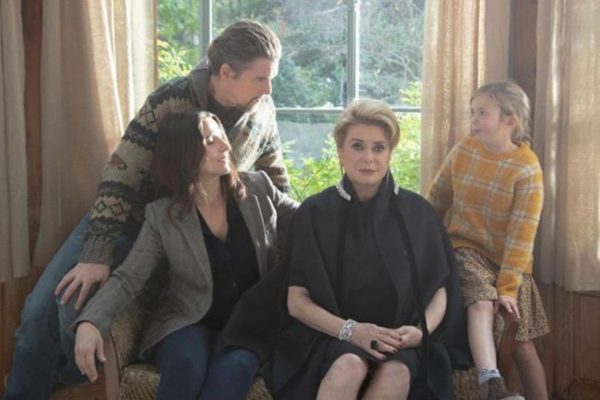What do you do if you’re Hirokazu Kore-eda, internationally-adored filmmaker of intricate, intimate family dramas, fresh of the back of winning the Palme d’Or? Few would have predicted he would jet off to France, rope in some Gallic acting royalty, and craft… an intricate, intimate family drama. It’s a risk to be sure, but the result demonstrates he can adapt effortlessly to European cinema while retaining the gossamer delicacy that is his signature.
Fabienne is a legendary actress in the Catherine Deneuve mould (played, appropriately, by Catherine Deneuve). Her daughter Lumir (Juliette Binoche) has arrived with her TV actor husband (Ethan Hawke) and adorable daughter (Clémentine Grenier), to celebrate the publication of her mother’s memoirs. The details in the book differ greatly from how Lumir’s recollects Fabienne’s life and career. Above all, they fail to acknowledge the ghost of an acting rival that has loomed large in her life for 40 years. Reconnecting with her family and starring in a low-budget philosophical sci-fi about a mother and daughter relationship help her reconcile with her past and accept the limited time she has left.
Kore-eda adapts his technique so well to his new surroundings that he’s actually in danger of losing himself in the register of the familiar bourgeois French drama. The Truth could easily have come from other filmmakers who have released thematically similar pictures in the last year, such as Olivier Assayas (Non-Fiction) and Nicolas Bedos (La Belle Époque). However, it also stands with the very best of this kind of drama.
Of course, it helps when a director can call on greats such as Deneuve and Binoche to add star power to the sparky, occasionally spiteful dialogue. Deneuve, in particular, is clearly relishing the richly intertextual role which could act as a summary of her own career and legacy. There are cheeky nods to films like Belle de Jour littered like little cinephile easter eggs. We first meet Fabienne as she imperiously eviscerates a hapless interviewer, and she continues in that vein. What Deneuve does so well is to give us glimpses of her huge reservoirs of sadness, at her neglectful relationship with Lumir, and the underhand, infelicitous way she has conducted her career. She responds by doubling down on her behaviour until her fictional role reflects her real emotions back at her like a mirror.
This being Kore-eda there’s a hefty weight that isn’t always apparent in other discursive French films focussing on the choppy relationships of wealthy French families (Michael Haneke‘s chilly, aloof Happy End being a recent example), particularly with the additional postmodern conceit of the Mise en abyme Fabienne is filming. For all the actress is often appalling, Kore-eda is an expert at chipping away at calcified emotions and the result is undoubtedly moving. There’s nothing quite as wrenching as he depicts in the masterful Shoplifters, but the power of The Truth flows in incrementally like a gentle tide. He also coaxes another preternaturally great child performance, this time from young Clémentine Grenier, whose cheeky, precocious Charlotte plays a big role in awakening Fabienne from her self-absorption.
Whether The Truth will rank among Kore-eda’s most beloved work is debatable. It’s impossible to say whether it’s the beginning of a new international direction, or whether it will be seen as an excellent but irregular digression on his CV. What it does show is the clout he holds in the industry that he can call on talent of the status of his female leads, and relegate the likes of Ethan Hawke to a fairly inconsequential supporting role. Even outside his familiar milieu, his compassion and humanism is very much in evidence, and The Truth will surely only enhance his reputation.
As Part of Glasgow Film Festival 2020
